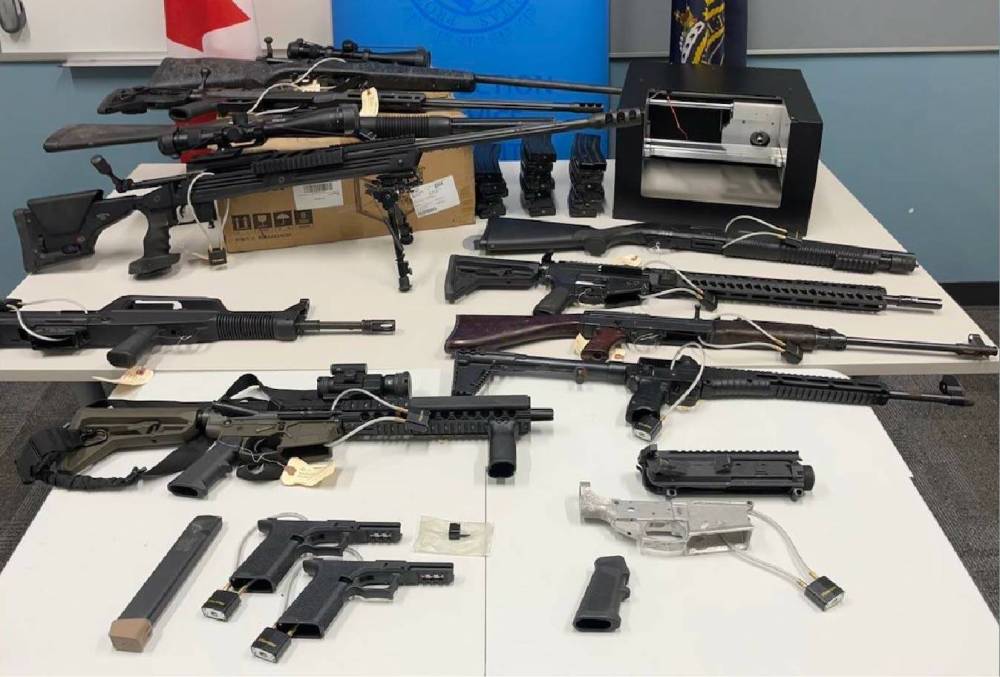A Manitoba man accused of making “ghost guns” remains behind bars after a Canada Border Services Agency investigation into illegal gun manufacturing.
Robert Ripcik, 53, is facing a slew of charges and has been denied bail. The agency announced details of the lengthy probe Tuesday.
The CBSA’s investigation — with assistance from the RCMP, the Winnipeg Police Service and Manitoba Conservation — began when border officers examined a shipment in April 2023 and found items related to the production of firearms without serial numbers. Such weapons, built with 3D printers, have been dubbed ghost guns, as the firearms aren’t easily traceable.

After obtaining a warrant, CBSA officers and Mounties searched a rural property near Chatfield, in the Interlake region, on March 12.
Investigators seized nine long guns — two of which were prohibited — and various parts for prohibited or restricted long guns or handguns. They also seized a 3D printer and ammunition.
CBSA officers returned to the property on April 9 and seized a fully automatic rifle without a serial number and an auto-sear for a Glock handgun, an illegal part that allows a gun to fire fully automatic.
Ripcik has been charged with unauthorized possession of firearms, possession of prohibited devices, possession of a prohibited firearm with readily accessible ammunition and firearms manufacturing, as well as with offences under the Customs Act.
Ripcik, who has no prior convictions but was given a peace bond on a number of allegations related to firearms in 2018, was denied release by provincial court Judge Vincent Sinclair at an April 10 hearing.
Sinclair, who said he denied bail to maintain the public’s confidence in the justice system, outlined details of the Crown prosecution’s case at the hearing.
Last April, CBSA agents in Alberta alerted their Manitoban counterparts about a series of shipments from an American company known to sell equipment for private firearms manufacturing to a Beausejour address, where an acquaintance of Ripcik resides.
The border agency intercepted a milling machine meant for manufacturing ghost gun parts, among other items deemed suspicious, including a USB drive containing schematics for an AR-15 rifle and various gun parts.
Border agents determined four other packages, some of which were addressed to what’s believed to be an alias of Ripcik’s, had been sent to the address from the American company.
RCMP also linked Ripcik to an alleged firearms manufacturer currently facing charges in Alberta via text messages. Texts reviewed by Mounties showed the two allegedly discussing the sale of an AR-15 rifle.
Later, when searching the property near Chatfield in March, investigators allegedly found evidence of wire transfers between the American gun manufacturing company and Ripcik, Sinclair said.
Ripcik has resided in Beausejour as well as at the rural property near Chatfield, but prosecutor Kristee Logan said at the bail hearing Ripcik has sold all of his property in Manitoba, has few ties to the province and plans to move to British Columbia or Alberta.
Logan asked Sinclair at the hearing to be allowed to present further information that had come to the Crown’s attention since prosecutors and defence made bail submissions in March.
Among those concerns were over how Ripcik would respond to law enforcement, were they to come to his residence while out in the community, said Logan.
Defence lawyer Jonathan Pinx said he wanted to provide context, calling Ripcik a “blusterer” who made comments via social media to someone he doesn’t know.
“If it’s bluster, it’s bluster about shooting police officers,” responded Logan, providing no further details of the allegations.
Sinclair denied the request to enter new information and instead issued his decision.
Ripcik’s next scheduled court date is June 7.
erik.pindera@freepress.mb.ca